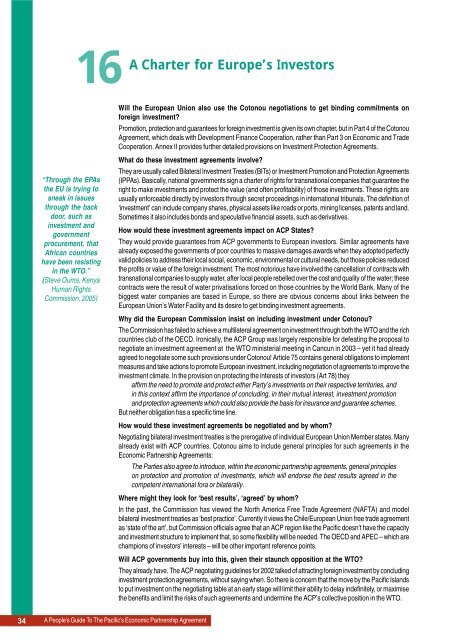REPA Booklet - Stop Epa
REPA Booklet - Stop Epa
REPA Booklet - Stop Epa
Create successful ePaper yourself
Turn your PDF publications into a flip-book with our unique Google optimized e-Paper software.
16<br />
A Charter for Europe’s Investors<br />
Will the European Union also use the Cotonou negotiations to get binding commitments on<br />
foreign investment?<br />
Promotion, protection and guarantees for foreign investment is given its own chapter, but in Part 4 of the Cotonou<br />
Agreement, which deals with Development Finance Cooperation, rather than Part 3 on Economic and Trade<br />
Cooperation. Annex II provides further detailed provisions on Investment Protection Agreements.<br />
“Through the EPAs<br />
the EU is trying to<br />
sneak in issues<br />
through the back<br />
door, such as<br />
investment and<br />
government<br />
procurement, that<br />
African countries<br />
have been resisting<br />
in the WTO.”<br />
(Steve Ouma, Kenya<br />
Human Rights<br />
Commission, 2005)<br />
What do these investment agreements involve?<br />
They are usually called Bilateral Investment Treaties (BITs) or Investment Promotion and Protection Agreements<br />
(IPPAs). Basically, national governments sign a charter of rights for transnational companies that guarantee the<br />
right to make investments and protect the value (and often profitability) of those investments. These rights are<br />
usually enforceable directly by investors through secret proceedings in international tribunals. The definition of<br />
‘investment’ can include company shares, physical assets like roads or ports, mining licenses, patents and land.<br />
Sometimes it also includes bonds and speculative financial assets, such as derivatives.<br />
How would these investment agreements impact on ACP States?<br />
They would provide guarantees from ACP governments to European investors. Similar agreements have<br />
already exposed the governments of poor countries to massive damages awards when they adopted perfectly<br />
valid policies to address their local social, economic, environmental or cultural needs, but those policies reduced<br />
the profits or value of the foreign investment. The most notorious have involved the cancellation of contracts with<br />
transnational companies to supply water, after local people rebelled over the cost and quality of the water; these<br />
contracts were the result of water privatisations forced on those countries by the World Bank. Many of the<br />
biggest water companies are based in Europe, so there are obvious concerns about links between the<br />
European Union’s Water Facility and its desire to get binding investment agreements.<br />
Why did the European Commission insist on including investment under Cotonou?<br />
The Commission has failed to achieve a multilateral agreement on investment through both the WTO and the rich<br />
countries club of the OECD. Ironically, the ACP Group was largely responsible for defeating the proposal to<br />
negotiate an investment agreement at the WTO ministerial meeting in Cancun in 2003 – yet it had already<br />
agreed to negotiate some such provisions under Cotonou! Article 75 contains general obligations to implement<br />
measures and take actions to promote European investment, including negotiation of agreements to improve the<br />
investment climate. In the provision on protecting the interests of investors (Art 78) they<br />
affirm the need to promote and protect either Party’s investments on their respective territories, and<br />
in this context affirm the importance of concluding, in their mutual interest, investment promotion<br />
and protection agreements which could also provide the basis for insurance and guarantee schemes.<br />
But neither obligation has a specific time line.<br />
How would these investment agreements be negotiated and by whom?<br />
Negotiating bilateral investment treaties is the prerogative of individual European Union Member states. Many<br />
already exist with ACP countries. Cotonou aims to include general principles for such agreements in the<br />
Economic Partnership Agreements:<br />
The Parties also agree to introduce, within the economic partnership agreements, general principles<br />
on protection and promotion of investments, which will endorse the best results agreed in the<br />
competent international fora or bilaterally.<br />
Where might they look for ‘best results’, ‘agreed’ by whom?<br />
In the past, the Commission has viewed the North America Free Trade Agreement (NAFTA) and model<br />
bilateral investment treaties as ‘best practice’. Currently it views the Chile/European Union free trade agreement<br />
as ‘state of the art’, but Commission officials agree that an ACP region like the Pacific doesn’t have the capacity<br />
and investment structure to implement that, so some flexibility will be needed. The OECD and APEC – which are<br />
champions of investors’ interests – will be other important reference points.<br />
Will ACP governments buy into this, given their staunch opposition at the WTO?<br />
They already have. The ACP negotiating guidelines for 2002 talked of attracting foreign investment by concluding<br />
investment protection agreements, without saying when. So there is concern that the move by the Pacific Islands<br />
to put investment on the negotiating table at an early stage will limit their ability to delay indefinitely, or maximise<br />
the benefits and limit the risks of such agreements and undermine the ACP’s collective position in the WTO.<br />
34<br />
A People’s Guide To The Pacific’s Economic Partnership Agreement
















